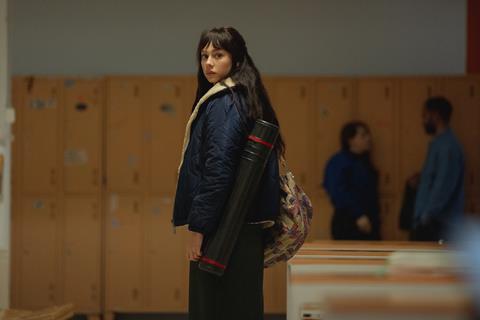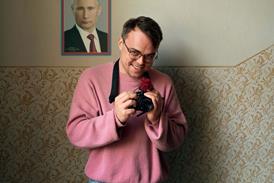A mysterious entity stalks three young women in this effective Spanish-language horror debut

Dir. Pedro Martín-Calero. Spain/Argentina/France 2024. 107mins
Death looms over the young in Spanish-language frightener The Wailing. That’s nothing unusual in horror; what’s fresh about this debut from director Pedro Martín-Calero is the stylistic precision and modernist cool with which the looming is calibrated. Not to be confused with the 2016 Korean film of the same title, this Wailing is a cleverly constructed, visually honed, female-centred three-parter that draws viewers into its labyrinth with absolute confidence – and even if it ultimately leads us to a predictable ending, that itself is part of a satisfying variation on genre tropes. Following the film’s San Sebastián competition debut, its eerieness should resonate way beyond the Spanish-language market.
A strong feminist angle gives the film a powerful currency
Things kick off with a wilfully disorienting intro laced with strobes and thunderous techno before we reach the first of three linked episodes, each with a separate young protagonist. The first, set in present-day Madrid, follows young student Andrea (Exter Esposito, from TV series Elite and Jaume Balaguero’s chiller Venus). Her boyfriend Pau (Alex Monner) is away in Sydney, and as they speak over their phones and laptops – bold-face captions and icons in yellow tracking their conversation on the screen – he notices a mysterious figure lurking in the background of a video call. It turns out to be a presence that can only be seen when filmed – and whose baleful power knows no geographic boundaries.
In the second part, the story jumps back several years to La Plata, Argentina, where film student Camila (Malena Villa) spots a mysterious, alluring young woman in the street. Erotically fascinated, Camila stalks her, making her the unwitting subject of a documentary short. The object of her affection is Marie (Mathilde Ollivier), a free spirit from France – but she too has the ominous presence hovering near her. And in a third part leading directly on from Camila’s story, the meticulously controlled suspense finally erupts into all-out scares as the story strands converge around a desperate Marie.
Co-written by the director and Rodrigo Sorogoyen collaborator Isabel Peña (The Beasts, TV series Riot Squad), this meticulously constructed narrative teases our expectations and perceptions. The dramatic execution is steely and super-controlled, Martín-Calero making ingenious use of space, in particular with cleverly seeded glimpses of a mysterious apartment, the locale for the film’s climactic revelations. Each episode has a somewhat different feel, partly because of the use of image technology from different eras – the omnipresent phones and laptops of the Andrea section (with its implicit commentary about a generation’s unshakeable screen addiction), the older camcorder textures of Camila’s story.
In the Madrid segment especially, Martín-Calero and DoP Constanza Sandoval make the most of claustrophobic spaces and rectangles within rectangles, while the La Plata section, which opens the story up to broad daylight, is no less menacing; this is one of those horror films in which spacious, well-lit modern apartments can be as ominous as any Old Dark House. And when the heroines do explore dark spaces, the use of a pitch-black screen ups the suspense very effectively – as do some bold deployments of near-total silence.
Martín-Calero is known for his adverts and music videos – notably for The Weeknd – and this assured debut should put him on the same path to international success as other recent Hispanic horror specialists. A strong feminist angle gives the film a powerful currency (suffice to say, the menace here is as much patriarchy as it is death), and the three young leads are compelling in different ways – most impressively perhaps, singer and actor Villa, whose Camila is a magnetic combination of watchfulness, audacity and simmering desire.
Production companies: Caballo Films, Setembro Cine, Tandem Films, Tarea Fina, Noodles Production
International sales: Film Factory info@filmfactory.es
Producers: Eduardo Villanueva, Nacho Lavilla, Fernanda Sel Nido, Cristina Zumarraga, Pablo E. Bossi, Juan Pablo Miller, Jérôme Vidal
Screenplay: Isabel Peña, Pedro Martín-Calero
Cinematography: Constanza Sandoval
Editor: Victoria Lammers
Production design: Jose Tirado
Music: Olivier Arson
Main cast: Exter Esposito, Mathilde Ollivier, Malena Villa, Alex Monner















![[Clockwise from top left]: Paul Thomas Anderson, Chloe Zhao, Ryan Coogler, Park Chan-wook](https://d1nslcd7m2225b.cloudfront.net/Pictures/274x183/9/0/0/1467900_writerdirectors_192733.jpg)





